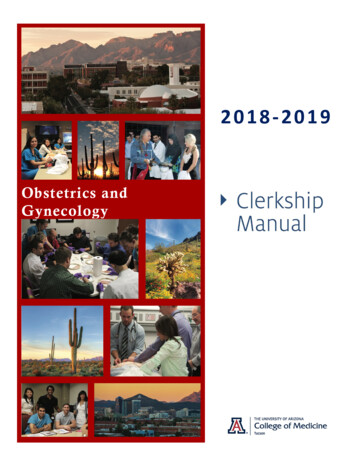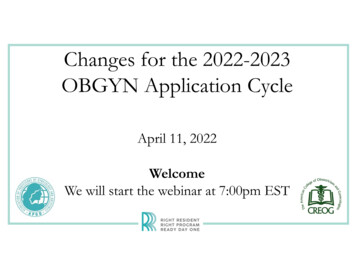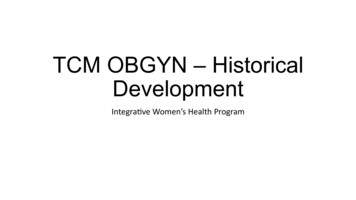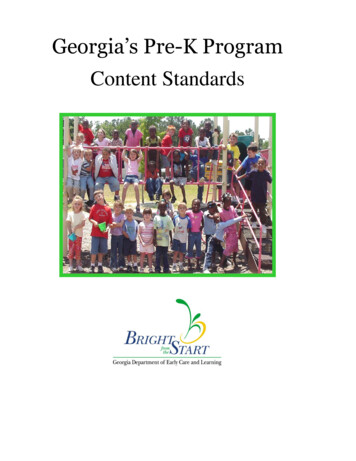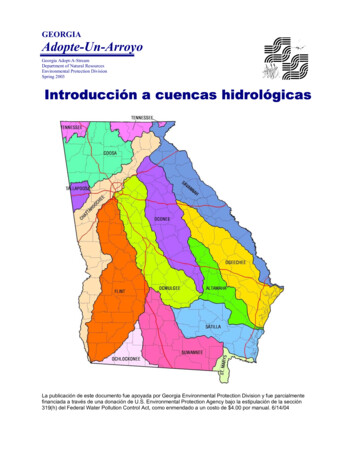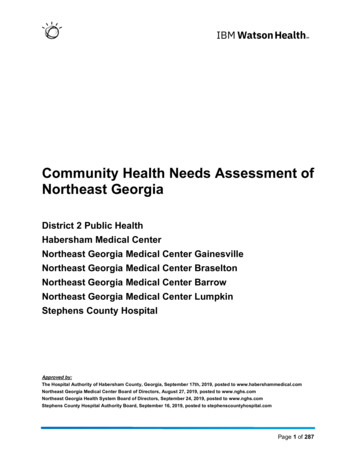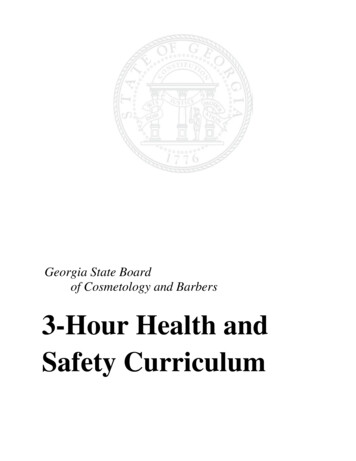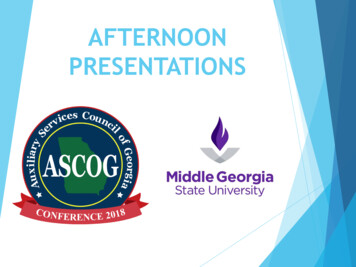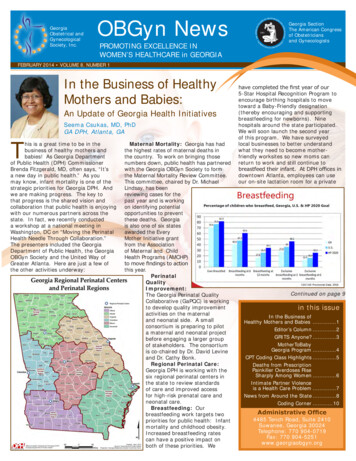
Transcription
GeorgiaObstetrical andGynecologicalSociety, Inc.OBGyn NewsPROMOTING EXCELLENCE INWOMEN’S HEALTHCARE in GEORGIAGeorgia SectionThe American Congressof Obstetriciansand GynecologistsFEBRUARY 2014 VOLUME 8, NUMBER 1In the Business of HealthyMothers and Babies:An Update of Georgia Health InitiativesSeema Csukas, MD, PhDGA DPH, Atlanta, GAThis is a great time to be in thebusiness of healthy mothers andbabies! As Georgia Departmentof Public Health (DPH) CommissionerBrenda Fitzgerald, MD, often says, “It’sa new day in public health.” As youmay know, infant mortality is one of thestrategic priorities for Georgia DPH. Andwe are making progress. The key tothat progress is the shared vision andcollaboration that public health is enjoyingwith our numerous partners across thestate. In fact, we recently conducteda workshop at a national meeting inWashington, DC on “Moving the PerinatalHealth Needle Through Collaboration.”The presenters included the GeorgiaDepartment of Public Health, the GeorgiaOBGyn Society and the United Way ofGreater Atlanta. Here are just a few ofthe other activities underway:Maternal Mortality: Georgia has hadthe highest rates of maternal deaths inthe country. To work on bringing thosenumbers down, public health has partneredwith the Georgia OBGyn Society to formthe Maternal Mortality Review Committee.This committee, chaired by Dr. MichaelLindsay, has beenreviewing cases for thepast year and is workingon identifying potentialopportunities to preventthese deaths. Georgiais also one of six statesawarded the EveryMother Initiative grantfrom the Associationof Maternal and ChildHealth Programs (AMCHP)to move findings to actionthis year.PerinatalQualityImprovement:The Georgia Perinatal QualityCollaborative (GaPQC) is workingto develop quality improvementactivities on the maternaland neonatal side. A smallconsortium is preparing to pilota maternal and neonatal projectbefore engaging a larger groupof stakeholders. The consortiumis co-chaired by Dr. David Levineand Dr. Cathy Bonk.Regional Perinatal Care:Georgia DPH is working with thesix regional perinatal centers inthe state to review standardsof care and improved accessfor high-risk prenatal care andneonatal care.Breastfeeding: Ourbreastfeeding work targets twopriorities for public health: Infantmortality and childhood obesity.Increased breastfeeding ratescan have a positive impact onboth of these priorities. Wehave completed the first year of our5-Star Hospital Recognition Program toencourage birthing hospitals to movetoward a Baby-Friendly designation(thereby encouraging and supportingbreastfeeding for newborns). Ninehospitals around the state participated.We will soon launch the second yearof this program. We have surveyedlocal businesses to better understandwhat they need to become motherfriendly worksites so new moms canreturn to work and still continue tobreastfeed their infant. At DPH offices indowntown Atlanta, employees can useour on-site lactation room for a privateContinued on page 9in this issueIn the Business ofHealthy Mothers and Babies .1Editor’s Column.2GRITS Anyone?.3MotherToBabyGeorgia Program.4CPT Coding Class Highlights.5Deaths from PrescriptionPainkiller Overdoses RiseSharply Among Women.6Intimate Partner Violenceis a Health Care Problem.7News from Around the State.8Coding Corner.10Administrative Office4485 Tench Road, Suite 2410Suwanee, Georgia 30024Telephone: 770 904-0719Fax: 770 904-5251www.georgiaobgyn.org
OBGyn NEWS, February 2014OBGyn NEWS, February 2014GRITS Anyone?Editor’s ColumnImmunization Registry Assists PhysiciansPhysician of the YearBen Sloat, MPH, GA DPH, Atlanta, GAwon it. At issuehere is not thefact that I havethus far beenoverlooked for thehonor (ouch), butthat the physician Inominated three ofthe last five yearsdoesn’t win it.Perhaps my essayslack somethingor maybe I’mnot lobbying theright people in theright way. But I’mconfident no oneelse is going to thetrouble I am goingive years ago, our hospitalto for this guy to win.administration started an annualHe is a surgeon; one of those old“Physician of the Year” award,school oncologic surgeons who haspresented at the medical staffoperated on everything, especially allChristmas party. Each year since itsinception a wonderful internal medicine kinds of cancer. He knows the headand neck, abdomen and pelvis like thedoctor has won it, with the exceptionback of his hand. But with the patientof the year our outstanding pathologistasleep and thefamily not allowedPAA is Helping Practices of All Sizes andin the OR, thereis no way for himSpecialties Nationwide Save Moneyto get the patientsatisfaction scoreshe deserves. Theydon’t get to observeSavings on a full range of goods and services coveringthe qualities thatessentially every area of practice operations with over 80make him soindispensable tovendor partners - Office Supplies to Injectables; Vaccineshis fellow surgeonsto EMR; Insurance to Medical Supplies and much more!– knowledge,skill, generosity,sense of humor,and most of allPLUS. Members have thewisdom. They don’tFREEunderstand thatopportunity to realize evenMembership!his very presencemore savings on vaccinesin the operatingNOwith our Vaccines Rabateroom vicinityContract!gives everyoneProgram!the feeling helpis just a pageaway, if needed.Even the guys onthe other side oftown call him. Hewww.physiciansalliance.com says he does itfor the patient.866-348-9780I’m convincedone of the mostimportant ways wePhysicians’ Alliance of America (PAA) is a nonprofit Group Purchasinggynecologists canOrganization (GPO) serving practices for over 20 years!take care of ourFJoin Today!2Margaret D. Schaufler, MDEditorLagrange, Georgiapatients is to forge great workingrelationships with the other surgeonsand specialists in town.As for awards, I am reminded ofa biography of the great physicist,Richard Feynman, written by hisdaughter.1 He shunned awards,honors and organizations thatmade him an honorary member. Heresigned from the National Academyof Sciences saying he found it“psychologically very distastefulto judge people’s ‘merit’.” He wasextremely careful about what kind ofaccolades he would agree to accept.(The 1965 Nobel Prize was a notableexception.) That always struck meas being true to purpose. It’s notsupposed to matter who getsthe credit.And yet, we live in a worlddominated by public relations,marketing and media glare sothat it’s next to impossible not tolet money and fame influence ouractions. It is also impossible for menot to care that this surgeon whomeans so much to so many behindthe red line in the OR, get sometangible recognition for his labors.I take comfort in knowing that fora person of his caliber, a heartfelt“thank you” from a colleague like youor me probably means as much asany institutional award. On the otherhand, maybe the mere existenceof such awards is a good thing if itcauses us to reflect upon all the greatpeople we know who deserve them.Did you know?Did you know Georgia law(Official Code 31-12-3.1) requiresall providers administering FederalDrug Administration (FDA) approvedvaccinations to any individual in thestate to submit accurate information toGeorgia’s Immunization Registry knowas GRITS? The law was enacted inApril 1996 as a childhood registry andexpanded in July 2004 as a birth todeath registry.The goals of the GeorgiaImmunization Registry include assistingproviders in reminding individuals whenthey or their children need or are pastdue for vaccinations, assisting providersin evaluating the immunization statusof their patients, and avoiding duplicateimmunizations.GRITS currently containsimmunization records for more than11 million individuals, and more than10,000 organizations across Georgiahave registered to become GRITS users.How to register to become a user ofGRITS?To gain access to the informationcontained in the GRITS system youmust contact the GRITS trainingcoordinator at 404-463-0810 or emailimmreg@dhr.state.ga.us and completean enrollment form as well as submit asigned software user agreement. Onceyou have submitted the signed softwareuser agreement and attended a GRITStraining session, you will receive anOrgCode, UserID and password to gainaccess to theinformationcontained inGRITS.interface solution with the Registry.Please contact the GRITS interfacestaff 404-463-0810 or email immreg@dhr.state.ga.us to inquire if yourvendor hasdevelopeda certifiedinterface withGRITS.When shouldClient andprovidersimmunizationsubmit data todata can beGRITS?exchangedThe GeorgiaGeorgia Registry of Immunization with theDepartment ofGRITS appliTransactions and ServicesPublic Healthcation usingrequests that immunization data beeither GRITS flat file specification orentered into the GRITS system within 30HL7 batch and real-time data transferdays of immunization provision.specifications. Prior to performing adata exchange, your provider orgaCan medical office staff enter recordsnization will need to contact a GRITSin the Registry?training coordinator and arrange to beset up in GRITS.Yes. The provider accepts responsibilityfor the submission of immunizationHow can I obtain more informationrecords according to the requirements ofthe registry legislation. The provider mayabout GRITS?also authorize additional members of theFor more information, visit theoffice staff to enter records.GRITS website ry-grits orWill GRITS interface with mycall 404-463-0810.existing Practice ManagementSystem or Medical RecordsBen Sloat is Special PopulationsManagement System?manager of the ImmunizationGRITS staff are willing to work withProgram for the Georgia Departmentany vendor who desires to build anof Public Health.SAVE THE DATEGeorgia OBGyn Society’sAnnual Golf TournamentBear’s Best, Suwanee, GAFor additional information, visit our website, georgiaobgyn.org, or call our office770-904-1792.Reference1. Feynman, Richard P. (2005). PerfectlyReasonable Deviations (from theBeaten Track) The Letters of Richard P.Feynman. New York, NY. Basic Books, AMember of the Perseus Books Group.Wednesday, May 14, 20143
OBGyn NEWS, February 2014OBGyn NEWS, February 2014MotherToBaby Georgia Provides AnswersAbout Medication Exposures During PregnancyAnew free service, providing expertis Emory School of Medicine’s Centeranswers about medications and other for Maternal Substance Abuse and Childexposures during pregnancyDevelopment and is run by Emory facultyand breastfeeding, is giving healthcareand staff. MotherToBaby Georgia is alsoproviders another tool to help expectantsupported and funded by the Georgiamoms in Georgia.Department of Behavioral Health andEmory UniDevelopmentalYOU have questions.MotherToBabyMissionversity School ofDisabilities.WE have answers.Medicine an“ReliableCall MotherToBaby GAnounces “Motherinformation isToBaby Georgia,”often difficult to(855) 789-6222a free statewidefind, especiallycounseling seronline. Wevice dedicatedwanted toto providingbe sure thatevidence-basedpregnant womenMotherToBaby GA,informationand health careto health careproviders knewprofessionals, exthat experts onpectant mothersthe most cuttingand the genedge researchCall Toll-FREE (866) 626-6847www.MotherToBaby.orgeral public aboutwere readilymedications and MotherToBaby GA provides resources and information available toother exposures to healthcare providers and patients concerning drug them,” explainsduring pregnancy and substance exposures during pregnancy throughClaire Coles,and while breastPhD, director ofEmory’s toll free number 855-789-6222 and thefeeding.MotherToBabywebsite: www.mothertobaby.org.Georgia. ColesMotherToBabyis also director of the Center for MaternalGeorgia is an affiliate of the internationalSubstance Abuse and Child Developmentnon-profit Organization of Teratologyat Emory School of Medicine and aInformation Specialists (OTIS), a profesprofessor in the Department of Psychiatrysional society that contributes to initiaand Behavioral Sciences.tives for education and birth defectsColes further explained the need for thisresearch. The Georgia affiliate’s homeMotherToBaby, a service of the non-profitOrganization of Teratology InformationSpecialists (OTIS), is dedicated to providingMonday - Friday9:00 am to 3:00 pm ESTevidence-based information to mothers,health care professionals, and the generalToll-FREEpublic about medications and other exposuresduring pregnancy and while breastfeeding.Email us:mothertobaby@emory.eduMotherToBaby affiliates support andcontribute to worldwide initiatives forVisit us online atMotherToBabyGA.orgteratology education and research.is funded byGeorgia Department of BehavioralHealth and Developmental Disabilitiesand supported by Emory UniversitySchool of Medicine:Georgia Department ofBehavioral Health & Developmental DisabilitiesLearn more atEmory.edu/msacdsort of counseling since approximately 50percent of women report taking at least onemedication during pregnancy.”The average woman doesn’t find out she’spregnant until she’s five or six weeks along.That means a woman could have been consuming alcohol or taking medications duringthis time without knowing she’s pregnant. Shethen finds herself deeply concerned about whatit might mean for her developing baby.”Surveys indicate that while the largestcategory of callers is pregnant women, mosthave been referred by their physicians andother health care providers such as nurses,midwives, and pharmacists.“What is passed from mother to baby isexactly what we educate the public about,which is why we strongly believe MotherToBaby Georgia will provide a beneficialservice in our state,” says Patricia Olney,MS, Emory certified genetic counselor andpregnancy risk information specialist. Olneyanswers calls from around the state andprovides counseling over the phone.In addition to a pregnant woman’s healthcare providers, MotherToBaby Georgia’s experts offer an added layer of support by providing her with an individualized risk assessmentso she may make informed health decisions.For more information about MotherToBaby Georgia, visit: www.mothertobaby.orgor www.emory.edu/msacd, call toll free inGeorgia: 855-789-6222, or email: mothertobaby@emory.edu.GOGS December CPT Coding Class HighlightsMore than 95 people attended the December 6th,“2014 CPT Coding Seminar for OBGyn Practices” atthe Atlanta Marriott Buckhead Hotel. Steve Adams ofInGuage Healthcare Solutions, Inc. presented ICD-10-CMfor OB Services, OBGyn Coding Updates for 2014 and ICD-10-CM for Genitourinary and Other Primary Care Services.Dr. Carla Roberts of Emory University Hospital presentedUnderstanding and Implementing the Affordable Care Act.In addition, Deborah Wexler of MAG Mutual presentedRisk Management and Patient Safety for the Medical n yourin yourofficeofficeeducation in your office BreastfeedingBreastfeedingProgramProgram BreastfeedingProgramImmunizationsProgramProgram ImmunizationsImmunizationsProgramEarnEarnCMECME& contact&contactcontacthourshoursEarnCME&hoursTo scheduleTo schedulea programa programforyouryourforofficeyour callTo schedulea programforofficeofficecall visitwww.GAepic.orgwww.GAepic.orgwww.GAepic.orgto completeto completea requesta requestform.form.to complete a request form. u u u u u u u AMA u AMAPRAPRACategoryCategory1 Credit(s) . u u 1 Credit(s) . u u u u u u u u u u u u 4Join the next GOGS CPT Coding ClassFriday, May 9, 2014Macon Marriott City Center Macon, GA Contact our office at 770-904-0719 to register.5
OBGyn NEWS, February 2014OBGyn NEWS, February 2014CDC Vital Signs News: Doctors Should Practice Caution when PrescribingPrescription painkiller overdose deaths are a growing problem among women.NUMBER OF 120022003200420052006200720082009201020SOURCE: National Vital Statistics System, 1999-2010 (deaths include suicides)Read text versionThe number of prescriptionpainkiller overdose deathsincreased fivefold among womenbetween 1999 and 2010, according toa Vital Signs report from the Centersfor Disease Control and Prevention(CDC).1 While men are more likelyto die of a prescription painkilleroverdose, since 1999 the percentageincrease in deaths was greater amongwomen (400 percent in womencompared to 265 percent in men).Prescription painkiller overdoses killednearly 48,000 women between 1999and 2010.“Prescription painkiller deaths haveskyrocketed in women (6,600 in2010), four times as many as diedfrom cocaine and heroin combined,”said CDC Director Tom Frieden, MD,MPH. “Stopping this epidemic inwomen – and men – is everyone’sbusiness. Doctors need to be cautiousabout prescribing and patients aboutusing these drugs.”The study includes emergencydepartment visits and deathsrelated to drug misuse/abuse andoverdose, as well as analyses specificto prescription painkillers. The keyfindings include: About 42 women die every day from adrug overdose.- Since 2007, more women have diedfrom drug overdoses than frommotor vehicle crashes.- Drug overdose suicide deathsaccounted for 34 percent of allsuicides among women comparedwith 8 percent among men in 2010.- Women between the ages of 25and 54 are more likely than otherage groups to go to the emergency6For the Vital Signs report, CDCanalyzed data from the National VitalStatistics System (1999-2010) andthe Drug Abuse Warning Networkpublic use file (2004-2010). Previousresearch has shown that women aremore likely to have chronic pain, beprescribed prescription painkillers,be given higher doses, and usethem for longer time periods thanmen. Studies have also shown thatwomen may become dependent onprescription painkillers more quicklythan men and may be more likelythan men to engage in “doctorshopping” (obtaining prescriptionsfrom multiple prescribers).“The prescription painkiller problemaffects women in different ways thanmen and all health care providerstreating women should be aware ofthis,” said Linda C. Degutis, DrPH, MSN,director of CDC’s National Center forInjury Prevention and Control. “Healthcare providers can help improve theway painkillers are prescribed whilemaking sure women have access tosafe and effective pain treatment.”Medicines for treatment of painand mental illness have benefitsand risks. For women, 7 in 10prescription drug deaths includepainkillers. But other prescriptiondrugs play a role in overdosesas well. Women are more likelythan men to die of overdosesdepartment from prescriptionpainkiller misuse or abuse. Womenages 45 to 54 have the highest riskof dying from a prescription painkilleroverdose.- Non-Hispanic white and AmericanIndian or Alaska Native women havethe highest risk of dying from aprescription painkiller overdose. Prescription painkillers have been amajor contributor to increases in drugoverdose deaths among women.- More than 6,600 women, or 18women every day, died from aprescription painkiller overdosein 2010.- There were four times more deathsamong women from prescriptionpainkilleroverdose48,000 women died of prescriptionthan for48,000 Nearlypainkiller* overdoses between 1999 andcocaine and2010.heroin deathscombined in2010.from prescription painkiller overdoses400% Deathsamong women have increased more than- In 2010,400% since 1999, compared to 265% amongthere weremen.more than200,000every woman who dies of a prescription30 Foremergencypainkiller overdose, 30 go to the emergencydepartment for painkiller misuse or abuse.departmentvisits foropioid misuseon medicines for mental healthor abuse among women; about oneconditions, like antidepressants.every three minutes.Antidepressants and benzodiazepinesAbuse of prescription painkillers by(anti-anxiety or sleep drugs) sendpregnant women also puts an infantmore women than men to emergencyat risk. Cases of neonatal abstinencedepartments. Mental health drugssyndrome (NAS)—which is a group ofcan be especially dangerous whenproblems that can occur in newbornsmixed with prescription painkillersexposed to prescription painkillers or other and/or alcohol. If patients takedrugs while in the womb—grew by almostmental health drugs and prescription300% in the US between 2000 and 2009.painkillers, they should discuss thecombination with their health careprovider.Steps that health care providers cantake when treating women include: Recognizing that women are at risk ofprescription painkiller overdose. Following guidelines for responsibleopioid prescribing, including screeningand monitoring for substance abuseand mental health problems. Using their states’ prescriptiondrug monitoring program; this canhelp identify patients who may beimproperly using opioids andother drugs. Discussing pain treatment options,including ones that do not involveprescription drugs. Discussing the risks and benefits oftaking prescription painkillers includingEvery 3 minutes, a woman goesto the emergency department forprescription painkiller misuseor abuse.Women betweenthe ages of 25and 54 are mostlikely to go tothe emergencydepartmentbecause ofprescriptionpainkiller misuseor abuse.50,000NUMBER OF EMERGENCY DEPARTMENT VISITSDeaths from Prescription PainkillerOverdoses Rise Sharply Among Women40,00030,00020,00010,0000 1818–2425-3435–4445–54AGE GROUP55–6465 when painkillers are taken for chronicconditions, and especially duringpregnancy. Avoiding prescribing combinationsof prescription painkillers andbenzodiazepines unless there is aspecific medical indication.Women can take steps to helpstay safe from prescription painkilleroverdoses, including: Using prescription drugs only asdirected by a health care provider. Discussing all medications they aretaking with their health care provider,including over-the-counter medications(such as for allergies). Discussing pregnancy plans with theirhealth care provider before takingprescription painkillers. Disposing of medications properly,as soon as the course of treatmentis done. Not keeping prescriptionmedications around “just in case.” Helping prevent misuse and abuseby not selling or sharing prescriptiondrugs. Never using another person’sprescription drugs. Getting help for substance abuseproblems (1-800-662-HELP) andcalling Poison Help (1-800-222-1222)with questions about medicines.Reference1. CDC. Deaths from Prescription PainkillerOverdoses Rise Sharply Among Women.www.cdc.gov. erOverdoses/index.html. Updated July 3, 2013.Accessed September 27, 2013.Intimate Partner Violenceis a Health Care ProblemTaylor Tabb, Decatur, GAIntimate Partner Violence (IPV) isa health care problem of epidemicproportions. In addition to theimmediate trauma caused by abuse,IPV contributes to a number ofchronic health problems, includingdepression, alcohol and substanceabuse, sexually transmitted diseasessuch as HIV/AIDS, and often limitsthe ability of women to manage otherchronic illnesses such as diabetes andhypertension. Each year, approximately 324,000pregnant women in the U.S. arebattered by their intimate partners.IPV is more common for pregnantwomen than gestational diabetesor preeclampsia — conditions forwhich pregnant women are routinelyscreened. However, few physiciansscreen pregnant patients for abuse. In multiple studies, patients havereported they would like theirhealthcare providers to ask themprivately about IPV. In one study, women whoreceived information about safetyfrom their healthcare providerwere more likely to end a relationshipbecause it felt unhealthy or unsafe(Miller et al, 2011).Simple Steps to Help Your PatientsThese simple steps can make a bigdifference in the lives of your patients: Display information and materials aboutIPV- Posters on exam room walls- Safety cards in bathrooms- Brochures in waiting rooms Have a list of agencies where patientscan get help. Call the Georgia CoalitionAgainst Domestic Violence (GCADV) at(404) 209-0280 or visit www.gcadv.org to get a list of your local domesticviolence agencies. Commit to learning more about howto assess and respond to abuse.Download free guides and tools fromFutures Without Violence (www.futureswithoutviolence.org) or callGCADV to learn about specialized healthcare provider trainings, (404) 209-0280.Taylor Tabb is Fatality Review ProjectCoordinator for the Georgia CoalitionAgainst Domestic Violence in Decatur, GA.7
OBGyn NEWS, February 2014OBGyn NEWS, February 2014News from Around the StateFebruary isAmerican Heart MonthHeartdisease is theNo. 1 killerof womenin America.It kills morewomen eachyear thanall formsof cancercombined, even breast cancer. Roughly43 million women in the U.S. areaffected by cardiovascular disease andone woman dies every minute as aresult. About 1 in 30 women die frombreast cancer each year. About 1 in3 women die each year as a result ofcardiovascular diseases or stroke.Heart disease is not an “old man’sdisease.” Since 1984, more womenthan men have died each year fromheart disease. This is because thesymptoms of heart disease canpresent differently in women asopposed to men. They can often bemisunderstood, even by physicians.For resources to promote Heart HealthMonth, visit http://www.heart.org/ orhttps://www.goredforwomen.org/February is alsoInternational Prenatal InfectionPrevention MonthThe goal of International PrenatalInfection Prevention Month is toraise awareness of steps women cantake to protect their unborn baby ornewborn from infections that causeserious health problems and to raiseawareness of infections such as HIV,Group Strep B, Cytomegalovirus andother infections that can affect ababy during pregnancy. For additionalinformation about InternationalPrenatal Infection Prevention Month,visit Pages/022813prenatal-infect-prev-month.aspxor /.Breast Cancer GenomicsStandards inPrimary Care ConferenceThe Georgia Breast Cancer GenomicConsortium is hosting a conference,8“The First Line of Defense:Application of Breast CancerGenomics Standards in PrimaryCare,” on February 21, 2014 at TheLodge and Spa at Callaway Gardens,Pine Mountain, GA. This conferencewill highlight use of the Breast CancerGenetics Referral Screening Tool(B-RST) in Georgia public health clinicsas well as ways to integrate genetic riskassessment into primary care clinics inour state.The United States Preventive ServiceTask Force (USPSTF) is recommendingprimary care providers screen womenfor BRCA 1/2 mutations with one ofseveral screening tools designed toidentify a family history. The B-RST, atwww.breastcancergenescreen.org, wascited as a tool to help providers reachthis goal. Since 2012, The GeorgiaBreast Cancer Genomic Consortiumhas implemented the use of the toolin 6 Georgia public health clinics inorder to identify women at high-risk forhereditary breast and ovarian cancer.To register for the conference, er/event?oeidk a07e8l8rrfb728ea66b&llr p8hguwcab.Emory 25th AnnualBreastfeeding ConferenceThe 25thAnnual Conference onBreastfeeding,sponsored byEmory Regional PerinatalCenter, will beheld March3-4, 2014at the EmoryConference Center in Atlanta, GA. Earna maximum of 10 AMA PRA Category 1Credits. The Conference was speciallydesigned to broaden perspectives and increase competence of those working withbreastfeeding and human lactation. Guestspeakers include Christina Smillie, MD,IBCLC, FAAP, FABM and Jenny Thomas,MD, MPH, IBCLC, FAAP, FABM, and manyother speakers. For additional informationor to register, visit ogy/Georgia Partnership forTelehealth 5th AnnualSpring ConferenceGPT’s Spring Conference presentsTelehealth: Transforming the Delivery of Healthcare, March 19-22,2014 at theOmni Hotelat CNNCenter, 100CNN Centerin Atlanta.FeaturedspeakersincludeGeorgiaDepartmentof Public HealthCommissioner Brenda Fitzgerald, MD;Jay Sanders, MD, CEO of The GlobalTelemedicine Group; and Reed V. Tuckson, MD, FACP, managing director ofTuckson Health Connections, LLC. Foradditional information and registration,visit http://www.gatelehealth.org/.2014 ACOG AnnualClinical MeetingThe 2014 ACOG ACM is April 26-30in Chicago, Illinois. Registration is openand the Annual Clinical Meeting will offer cuttingedge topics, Lunchand Learnseminars,hands-oncourses,postgraduate coursesand clinicalseminars.For additional meeting information visitthe ACOG ACM webpage http://www.acog.org/acm.GOGS CPT Coding SeminarMay 9thThe nextGOGS CPTC
Perfectly Reasonable Deviations (from the Beaten Track)Physicians' Alliance of America (PAA) is a nonprofit Group Purchasing The Letters of Richard P. Feynman. New York, NY. Basic Books, A Member of the Perseus Books Group. won it. At issue here is not the fact that I have thus far been overlooked for the honor (ouch), but that the physician I


